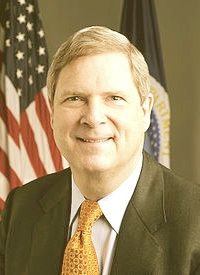
Agriculture Secretary Tom Vilsack (left) claims food stamps and other forms of government welfare are camouflaged stimulus programs that stir job growth by pumping money into the economy. After questioned about the cancerous issue of unemployment and the growing number of impoverished Americans forced to live on food stamps, Vilsack responded that the reason so many Americans are on food stamps ? 46 million, or one in seven people ? is because the Obama administration has helped states get “the word out” about the program.
During an interview on MSNBCs “Morning Joe,” Vilsack asserted that though the food stamps program dates back to 1939, large states such as Texas and California have “underperformed” in bridging eligible participants to the program. “The reason why these numbers have gone up is that weve done a pretty good job of working with states that had done a poor job in the past in getting the word out about this program,” he alleged. “Were now working with them to make sure that people who are eligible get the benefits.”
Vilsack then touted the “economic benefits” of food stamps:
Well, obviously, it’s putting people to work. Which is why we’re going to have some interesting things in the course of the forum this morning
I should point out, when you talk about the SNAP [Supplemental Nutrition Assistance Program] program or the food stamp program, you have to recognize that it’s also an economic stimulus. Every dollar of SNAP benefits generates $1.84 in the economy in terms of economic activity. If people are able to buy a little more in the grocery store, someone has to stock it, package it, shelve it, process it, ship it. All of those are jobs. It’s the most direct stimulus you can get in the economy during these tough times.
Vilsacks argument is that when the government redistributes taxpayers money to food stamp recipients, the money is spent immediately not saved or invested which in turn creates jobs. CNSNews.com countered, “This claim, however obscures the fact that both saving and investment are also economically productive activities contributing to credit availability and business growth respectively.” Further, it “ignores the fact that taxpayers whose money is used to fund food stamp programs may have spent their money on other things, including food, thus also contributing to the economy.”
This is not the first time a Democrat has heralded the government welfare mechanism as economic stimulus. Last summer, House Minority Leader Nancy Pelosi (D-Calif.) offered a rather unique economic philosophy: unemployment benefits create jobs faster than almost any other program, because they “inject demand into the economy.”
Pelosis argument mirrors Vilsacks in that she claims unemployment benefits are spent immediately, because struggling families generally spend, rather than save, the dollars they receive. Thus, Pelosi and Vilsack both agree, the dollars welfare recipients incur are promptly infused back into the economy.
However, if for every dollar spent on food stamps creates $1.84 in economic production, where are the jobs? And why arent GDP numbers reflecting such extravagant growth? Critics answer with the redistribution theory, that every dollar the government dishes out to welfare recipients is a dollar confiscated from the private-sector where real economic growth lies.
So the dollars stripped from business owners, who create societys jobs, are recycled through a leaky government pipeline and thrust into the hands of SNAP recipients, who then spend these dollars in what Michelle Obama calls “food deserts” low-income areas littered with fast-food chains and corner stores selling overpriced apples and oranges. Ironically, the Obama administrations welfare philosophy is obstructing the First Ladys “War on Obesity.”
Indeed, Vilsacks acknowledgement of the federal governments campaign to “get the word out” is not only destroying productive jobs, but adding pounds to Americas children.
In an added twist, the Obama administration has been tossing around ideas about a new federal department the “Department of Jobs.” This must be in addition to the Department of Labor, and in addition to the Department of Commerce.
The satirical critics out there may suggest that creating a massive government “jobs department” could mean hiring vast sums of new people which, of course, in that case the problem is solved.



